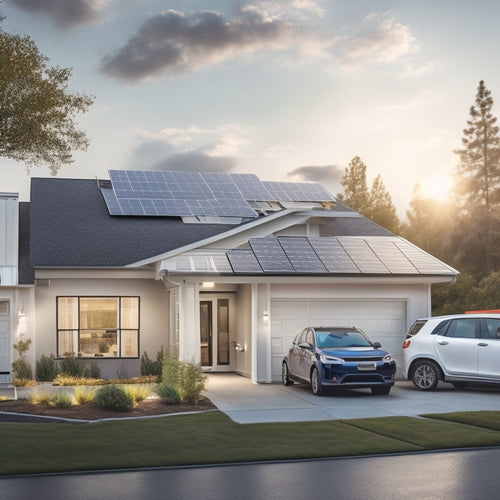
5 Essential Financing Options for Homeowners
Share
You have multiple financing options to choose from as a homeowner, including online loan options for quick cash, solar financing through partners, low-interest rate solar loans, government-backed solar financing, and financing with solar panel brands. Each option offers unique benefits, such as faster approval, lower interest rates, and customizable repayment terms. These financing options can help you tackle home repairs, renovations, or solar panel installation while managing your budget. Explore these essential financing options to find the best fit for your financial goals and make informed decisions. Now, take a closer look at each option to find the one that's right for you.
Key Takeaways
• Online loans provide quick cash for home repairs, renovations, or debt consolidation with faster application and approval processes.
• Partnered solar financing options offer affordable models like PPAs and lease agreements for renewable energy solutions.
• Low-interest rate solar loans provide an affordable way to finance solar panel installation with lower interest rates than traditional loans.
• Government-backed solar financing programs, like the FHA's PowerSaver loan, offer favorable terms and tax credits for energy-efficient improvements.
• Solar panel brands offer competitive financing options with customized plans and additional incentives to reduce upfront costs.
Online Loan Options for Homeowners
When you're in need of quick cash for home repairs, renovations, or consolidating debt, online loan options can provide a convenient and often faster alternative to traditional lenders. With online lending, you can bypass the lengthy application and approval processes associated with traditional banks and credit unions. Instead, you can apply from the comfort of your own home and receive a decision in a matter of minutes.
One popular online loan option is peer lending, which connects borrowers with investors willing to lend money. This platform offers competitive interest rates and flexible repayment terms.
Additionally, you can consider tapping into your home's equity to secure a loan. Home equity loans and lines of credit allow you to borrow against the value of your property, providing access to a larger sum of money at a lower interest rate. Online lenders offering home equity loans often have more lenient credit score requirements and faster processing times than traditional banks.
Solar Financing Through Partners
Through partnerships with solar installers and financing companies, homeowners can now access affordable solar financing options, making it easier to switch to renewable energy and start saving on their electricity bills.
You can benefit from these partnerships, which provide various financing models tailored to your needs. One popular option is the power purchase agreement (PPA), where you pay a fixed rate for the electricity generated by the solar panels. Another option is the lease agreement, where you pay a monthly fee to use the solar panels.
These partnerships have created extensive partner networks, connecting you with reputable solar installers and financing companies. This network allows you to compare financing models and choose the one that best suits your budget and energy goals.
Low-Interest Rate Solar Loans
You can access low-interest rate solar loans, which offer a more affordable way to finance your solar panel installation, with interest rates often lower than those of traditional loans. This financing option is ideal for homeowners who want to invest in renewable energy without breaking the bank.
With low-interest rate solar loans, you can enjoy the benefits of energy efficiency while keeping your monthly payments manageable. These loans are designed specifically for solar panel installations, making it easier for you to switch to a clean and sustainable energy source.
Government-Backed Solar Financing
Government-backed solar financing options, such as the Federal Housing Administration's (FHA) PowerSaver loan program, offer homeowners an alternative financing solution with more favorable terms and lower down payments.
You can take advantage of federal incentives, such as tax credits, to offset the cost of installing solar panels. The PowerSaver program, for instance, allows you to finance up to $25,000 for energy-efficient improvements, including solar panel installations.
With government-backed financing, you can enjoy lower interest rates and longer repayment terms, making it more affordable to switch to renewable energy. Additionally, you'll be contributing to a cleaner environment and reducing your reliance on fossil fuels.
Financing With Solar Panel Brands
Many solar panel brands offer financing options, partnering with lenders to provide competitive rates and terms that help homeowners overcome the upfront cost of solar installation. This approach allows you to reap the benefits of solar energy while spreading the cost over time.
When exploring financing options with solar panel brands, consider the following:
-
Competitive Pricing: Compare panel pricing among different brands to make sure you're getting the best deal. Some brands may offer more competitive pricing than others, so it's vital to shop around.
-
Solar Incentives: Look for brands that offer additional solar incentives, such as rebates or discounts, to further reduce the upfront cost of installation.
-
Customized Financing: Some brands may offer customized financing options tailored to your specific needs and budget. Be sure to ask about these options when exploring financing with a solar panel brand.
Frequently Asked Questions
Can I Use Financing Options for Non-Solar Home Improvements?
You can use financing options for non-solar home improvements, such as home renovation projects focused on energy efficiency, to upgrade your living space while reducing your environmental footprint and energy bills.
What Is the Minimum Credit Score Required for Solar Financing?
As you step into the modern era, leaving horse-drawn carriages behind, you'll find that lenders typically require a minimum credit score of 650-700 for solar financing, which involves a thorough credit check before loan approval.
Are There Financing Options for Renters or Non-Homeowners?
You're not a homeowner, but still want to go solar? Don't worry, you're not alone - it's a common renters' dilemma. Fortunately, there are financing alternatives, such as community solar programs or solar leasing options, that can help you harness the power of solar energy.
Can I Finance Solar Panels Through a Home Equity Loan?
You can finance solar panels through a home equity loan, leveraging your home's value to tap into Solar Benefits like energy savings and increased property value; compare loan options carefully to maximize your investment.
Do Solar Financing Options Affect My Property Taxes?
As you consider solar financing, you're wise to wonder if it'll impact your property taxes. Rest assured, a property appraisal won't be affected, but you might enjoy tax incentives, offsetting potential increases.
Related Posts
-

What Electric Vehicle Owners Need for Home Energy
As an electric vehicle owner, you need to optimize your home energy system to guarantee efficient, sustainable, and c...
-

Top 10 DIY Conversion Kit Reviews and Tips
You're taking the first step towards electrifying your ride, and with the right DIY conversion kit, you'll be cruisin...
-

Safely Staying on Course: 5 Essential Lane Tips
You're about to take your driving skills to the next level by mastering the art of staying in your lane. First, inves...


